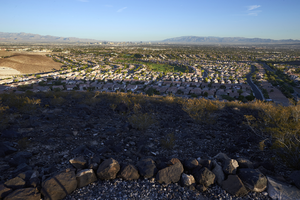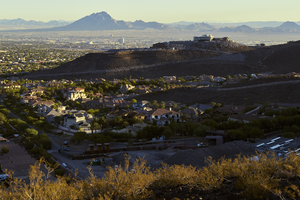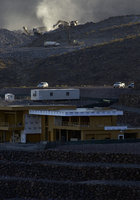Search the Special Collections and Archives Portal
Search Results

Single Family homes in Sun City MacDonald Ranch, Henderson, Nevada: digital photograph
Date
2016-10-12
Archival Collection
Description
Homes in the Sun City MacDonald Ranch as seen from the City View Trail in Henderson.
Image

Dawn view of Las Vegas Valley from MacDonald Ranch, Henderson, Nevada: digital photograph
Date
2016-10-12
Archival Collection
Description
The Las Vegas skyline as seen behind Sun City MacDonald Ranch from the City View Trail in Henderson.
Image

Dawn view of Las Vegas Valley from MacDonald Ranch, Henderson, Nevada: digital photograph
Date
2016-10-12
Archival Collection
Description
The Las Vegas skyline as seen behind Sun City MacDonald Ranch from the City View Trail in Henderson.
Image

Single Family homes in Sun City MacDonald Ranch, Henderson, Nevada: digital photograph
Date
2016-10-12
Archival Collection
Description
Homes in the Sun City MacDonald Ranch as seen from the City View Trail in Henderson.
Image

Single Family homes in MacDonald Highland, Henderson, Nevada: digital photograph
Date
2016-10-12
Archival Collection
Description
Homes in the MacDonald Highlands development as seen from the City View Trail in Henderson.
Image

Solar on a single family home in Sun City MacDonald Ranch, Henderson, Nevada: digital photograph
Date
2016-10-12
Archival Collection
Description
An early solar panel adopter's residence sits in a sea of homes in the Sun City MacDonald Ranch as seen from the City View Trail in Henderson.
Image

Development of upscale homes in mountains, Henderson, Nevada: digital photograph
Date
2016-10-12
Archival Collection
Description
Development of upscale home in the mountainous areas of Henderson including the MacDonald Highlands area as seen from the City View Trail in Henderson.
Image

Dawn view of Las Vegas Valley from MacDonald Ranch, Henderson, Nevada
Date
2016-10-12
Archival Collection
Description
The Las Vegas skyline as seen behind Sun City MacDonald Ranch from the City View Trail in Henderson.
Image

Dawn view of Las Vegas Valley from MacDonald Ranch, Henderson, Nevada: digital photograph
Date
2016-10-12
Archival Collection
Description
The Las Vegas skyline as seen behind Sun City MacDonald Ranch from the City View Trail in Henderson.
Image

Upscale single family homes under construction in the Ascaya development, Henderson, Nevada: digital photograph
Date
2016-10-12
Archival Collection
Description
Construction work continues on upscale residential homes in the Ascaya development as seen from the City View Trail in Henderson.
Image
Pagination
Refine my results
Content Type
Creator or Contributor
Subject
Archival Collection
Digital Project
Resource Type
Year
Material Type
Place
Language
Records Classification
